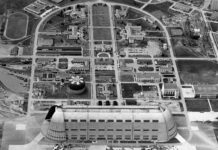Unsung Heroes at NASA’s Johnson Space Center: Facility Managers Ensuring Safety and Efficiency
At the Johnson Space Center in Houston, not all heroes wear capes or blue flight suits. Instead, some of them dedicate their efforts to ensuring the safety and well-being of their colleagues by managing facilities effectively. These individuals might train their coworkers on emergency evacuation procedures, investigate office accidents, remove potential hazards, or even fix a leaky bathroom sink or a broken coffee maker.
These unsung heroes are the approximately 135 on-site facility managers responsible for the safety and health of every building and its occupants.
The Facility Manager Program
Established in 2009, the Facility Manager program covers buildings at the Johnson Space Center, Sonny Carter Training Facility, and Ellington Field. Each building has a primary Facility Manager and an alternate. These individuals are responsible for developing emergency action plans and serving as facility fire wardens. They post safety alerts, notices of renovation and construction work, and share information about any interruptions to building access or utilities. Additionally, they coordinate between building occupants, safety personnel, facility operations, and emergency responders as needed.
Vanessa Jordan, the lead facility manager for the entire Johnson site, emphasized the community-oriented nature of their work. "We are a relatively close-knit community and rely on each other for assistance and advice, especially from the veteran facility managers," she said. Both Jordan and Darrell Palmer, the Alternate Lead Facility Manager, establish policies and procedures for the Facility Manager program. They ensure that all applicable safety and health regulations are communicated and enforced site-wide.
Responsibilities and Training
Jordan elaborated on their roles: "We are responsible for advising the facility managers on new and current policies and regulations relating to the safety and security of the buildings and their occupants. We also inform them of any changes in policies or procedures and events around the center that might affect the buildings and occupants, such as road closures or hurricanes."
Jordan and Palmer also oversee Facility Manager training. They provide bi-annual training for new facility managers and periodic forums with subject matter experts on topics relevant to the team’s responsibilities. "We are available to address any questions or concerns the facility managers may have regarding their role, buildings, or occupants," she added. "We serve as the liaison and advocate for them with their organizations, my organization (which controls the program), the center, and our stakeholders."
Jordan, who is also a facility engineer in the Center Operations Directorate’s Facilities Management and Operations Division, joined Johnson’s team in 2008 after working for four years at NASA Headquarters in Washington, D.C. She served as Johnson’s facility manager coordinator for seven years before becoming the lead in 2019. "I enjoy helping, meeting people, and developing relationships," she said. "Even though I do a lot of routine work, there is something new to experience, deal with, or learn every day."
Personal Stories of Facility Managers
Connecting with others is also what Angel Olmedo enjoys most about being a facility manager. “There’s no greater sense of purpose than being the person people rely on to find the help or solutions they need to finish their day strong and productive,” he said. “I’ve learned new skills and had a chance to meet and interact with a lot more people than I did before.”
Olmedo has worked at Johnson for nearly five years on the Human Space Flight Technical Integration Contract. In the spring of 2024, he was offered the opportunity to become the facility manager for buildings 4 south and 4 north, and the alternate facility manager for building 17. “During my first few years working here at Johnson, I enjoyed helping people get solutions to their technical problems – be they application related, access issues, or credentials,” he said. “I found that in becoming a facility manager I can continue to do something similar in a whole new way.”
Sid Dickerson has been the prime facility manager for building 17 and alternate for buildings 4 south and 4 north since November 2022. An IT specialist and property custodian at Johnson for more than 30 years, Dickerson takes pride in resolving issues quickly and efficiently and strives to maintain excellent customer feedback. “I want to be the best facility manager for my employer and customers as I help the facility achieve maintenance, cleaning, health and safety, and scheduling goals,” he said. One of his favorite experiences was working with a team of engineers, IT specialists, and maintenance staff to modernize the building 17 elevators.
Michael Meadows, the facility manager for buildings 10, 9 south, and 260, was inspired to join the Johnson team while delivering newspapers onsite. As a student at Alvin Community College, Meadows noticed a facility manager plaque on the wall of Johnson’s External Relations Office. “I knew that with hard work and dedication, I would one day become a Johnson employee and support flight and see my photo on that wall!”
Meadows began working at Johnson in 1999 and has been a facility manager for 23 years. He received a Silver Snoopy Award in May 2011 in recognition of the support he provided to the International Space Station Program as the manager for Johnson’s manufacturing facilities.
Becoming a Facility Manager
Some Johnson team members are hired specifically for a facility manager position, while others may volunteer or be appointed by their organization’s management. Regardless of how they became a facility manager, each person must complete an initial and refresher training covering topics such as hazard identification and mitigation, energy conservation, security, and legal considerations. Additional training may be required depending on building assignments. Once fully trained, facility managers may stay in that role as long as they work at Johnson.
According to Meadows, the most rewarding part of being a facility manager is “the feeling you get when you keep up with the facility and make that a great home for all the occupants every day.”
Conclusion
Facility managers at NASA’s Johnson Space Center play a crucial role in ensuring that the buildings and their occupants are safe and well-maintained. Their diverse responsibilities range from emergency planning to day-to-day maintenance, and their efforts contribute significantly to the smooth operation of the center. If you’re interested in exploring a career at NASA, visit their Careers site to find open opportunities and discover how you can become part of this dedicated team.
These facility managers truly exemplify the spirit of teamwork and dedication, proving that heroes come in many forms and their contributions are invaluable to the success of NASA’s missions.
For more Information, Refer to this article.


































